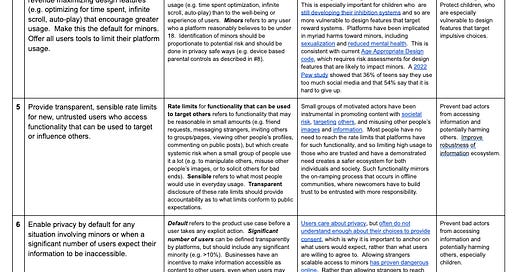Introducing the Neely Center Design Code for Social Media
We introduce a set of specific design solutions for improving social media's impact on society, especially given upcoming global elections and the increasing ubiquity of generative AI.
The negative effects of social media on society are widely discussed, but agreement on potential solutions has been lacking. One of society’s biggest debates is whether platforms should moderate content more or moderate content less. In contrast, we have argued for moving beyond content moderation and instead addressing upstream design in mainstream writing, at conferences, in academic publications, and in podcasts, often alongside partners who share a similar perspective.
To build on this momentum and offer concrete solutions, USC's Neely Center drafted a set of specific design changes that would improve social media’s impact on society, building on evidence from both internal company product work and external studies. We solicited and incorporated feedback from a wide set of stakeholders, including technologists, academics, and civil society groups to improve the recommendations, resulting in a set of proposed "design codes" we encourage social media platforms to adopt
These standards are meant to avoid the trap of relying on controversial top-down definitions of what is or is not harmful content. Broadly, they enable greater explicit user control, protect children through better defaults, improve incentives for publishers, and prevent small groups of users from manipulating and harming others. This is especially important given upcoming global elections set to take place in a world of increasingly powerful generative AI.
Among the initial signers are leading academics (representatives from USC, NYU, Notre Dame, Berkeley, Brown, Yale), authors (Jonathan Haidt, Charles Montgomery), civil society organizations (Build Up, Center for Humane Technology, Psychology of Technology Institute, Tech Justice Law Project, Prosocial Design Network), and technologists with experience at both small (Pebble, Ranker, Sparkable) and large (Twitter, Facebook, Google) tech companies.
Below are links to the code and signature form and we now welcome anyone to express their support by filling out this form. It is worth noting a few specific things about this code to address common questions and criticisms we have received:
"It doesn't go far enough!": The document explicitly states that it represents a consensus amongst a broad group, so therefore most signers will have other concerns they would like addressed. These codes are a "minimum" that a broad group can agree to and do not represent every change that every signer would like to see in effect.
"I don't believe in unconstitutional government mandates!": The document takes no position as to how such changes should be implemented (e.g., voluntarily vs. by policy), but rather shows consensus that a broad group feels these changes would be beneficial.
"I don't trust people to be neutral about what content to address!": The changes in the document are "content agnostic" and require no top down judgments or agreement on what content is good/bad/violating/misinformation/hate. Rather it focuses proposed changes on improving the experience and agency of users.
"I don't think this should be forced on small platforms.": The changes are meant to mirror social forces that exist offline and the document explicitly states that they are more applicable and more readily implementable by larger platforms, where such forces are more often lacking.
Design Code Link: https://neely.usc.edu/design-code
If you would like to publicly sign and support this effort, please use this form: https://neely.usc.edu/design-code-signatures
We are hopeful that we can move society from a conversation as to whether social media is good or bad, and towards a conversation about how to specifically design it better.
Click here or on the image for full design code document.
—
We welcome your feedback. The form has a space for comments and we welcome them. Time permitting, representatives from USC's Neely Center, would be glad to schedule time to answer questions from interested parties. Feel free to email raviiyer@marshall.usc.edu with any questions or requests.




